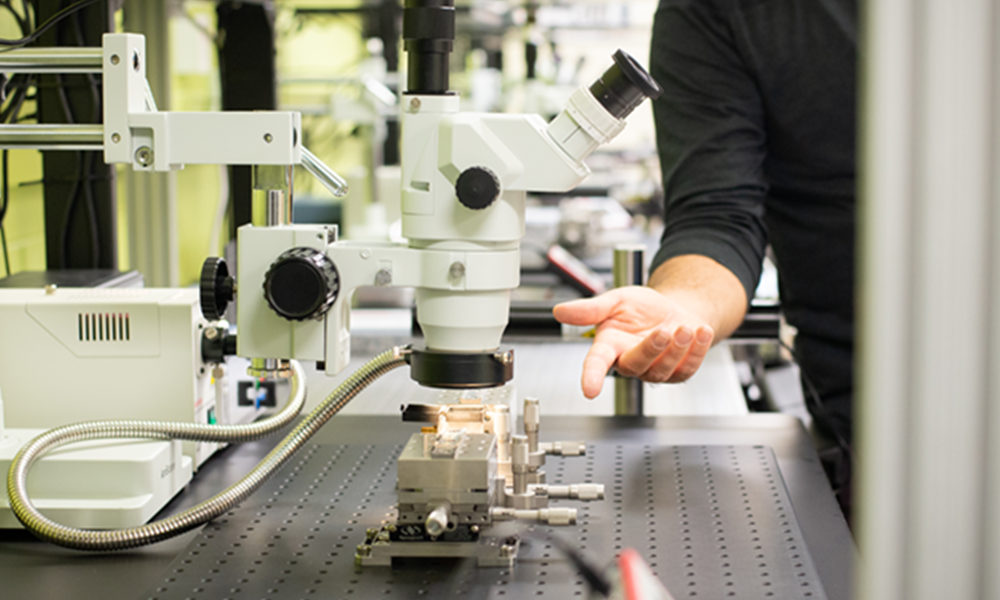Housing and Economic Development Secretary Mike Kennealy recently visited UMass Boston to announce a $999,000 grant from the Commonwealth of Massachusetts to install new quantum computing infrastructure at two universities, Western New England University (WNE) and UMass Boston.
The grant will support a new low-temperature measurement facility at WNE, which will boost the research and development of hardware for use in prototype quantum computers. The grant is from the Collaborative Research and Development Matching Grant Program, an effort managed by the Innovation Institute at the Massachusetts Technology Collaborative (MassTech), and will support a three-year, $1,999,774 project managed by UMass Boston in partnership with Western New England University in Springfield.
The project will create a collaborative network among the research centers at the two universities and with three Massachusetts-based small businesses: Amherst's Millimeter Wave Systems, LLC, Cohasset's Quantum Microwave, and JanisULT, located in Woburn. This network will boost the commercialization of computing hardware and support workforce development for the quantum information industry.
"The Commonwealth is a global leader when it comes to cutting-edge technology," said Baker. "In quantum computing, we not only have an opportunity to lead on the research side, but we also have a growing, competitive sector of companies that will help develop new products and tools to drive innovation and we are pleased to support this project."
"These new research centers will provide relevant training opportunities for STEM students in eastern and western Massachusetts, giving them access to R&D tools that are available in only a few places around the world," added Lt. Gov. Karyn Polito. "For our local tech companies, these new centers will provide a key pipeline of well-trained students that are ready to join this growing sector."
Quantum computing is a fast-growing field, with Massachusetts poised to take a leadership role. As highlighted by the U.S. Department of Energy, quantum computers consist of quantum bits, or "qubits," which can store more information than traditional computers, but need super-cooled systems in order for researchers to study them. The Commonwealth's investment in these low-temperature R&D facilities will create new opportunities for Massachusetts companies to validate and test their products. The increased access to R&D will help shorten the product development cycle and support increased pricing for Massachusetts-based quantum supply chain companies that sell into large computing services companies.
"By supporting increased capacity of quantum computing in the Commonwealth, we can support local companies in their efforts to unlock new and innovative advancements that will have applications in areas such as aerospace, data analytics, cybersecurity, robotics, and artificial intelligence," said Housing and Economic Development Secretary Mike Kennealy. "Through this investment and by working in partnership with UMass Boston and Western New England University, we can also give students a head start by providing access to the tools and training as they look to join the workforce in this important field."
The project will fund the establishment of two quantum-focused R&D facilities, providing increased opportunities for companies and students across the state:
- A low-temperature measurement facility located at Western New England University, with a 50 millikelvin refrigerator to develop cryogenic radio frequency (RF) microwave support hardware for use in prototype quantum computers; and
- An ultra-low temperature measurement facility located at UMass Boston, including a 20 millikelvin dilution refrigerator for state-of-the-art quantum hardware validation and development.
Western New England University and UMass Boston will also utilize the facilities for workforce training, helping to create a quantum trained workforce by introducing engineering students with related skills to quantum information sciences and making this training available to engineers already in the workforce. Students will gain experience and understanding of the RF engineering, low-noise measurements, and cryogenic technology needed to realize a superconducting quantum computer.
"As we continue to see, higher education can play a key anchor role in the knowledge economy," said UMass Boston Chancellor Marcelo Suárez-Orozco. "By aligning the intellectual resources of UMass Boston and Western New England with local and regional priorities, we deepen an ecosystem for applying knowledge and delivering solutions."
"Building strong industry partnerships is key to solving the world's greatest challenges," said Western New England University President Dr. Robert E. Johnson. "This partnership aligns well with our strengths and goals as a New Traditional University and our commitment to student career readiness through relevant industry-aligned learning opportunities."
To date, the Collaborative R&D Matching Grant Program has awarded more than $31 million to projects across the state, leveraging more than $50 million in matching contributions from outside partners. This includes 10 projects that have supported innovative industry-academic collaborations and investment in novel R&D infrastructure to bolster the Massachusetts tech and innovation economy statewide.
"A core goal when we reopened this program was to identify new opportunities and new sectors where Massachusetts could play a leadership role," said Pat Larkin, Deputy Director of the MassTech Collaborative. "The proposal from UMass Boston, and their partnership with Western New England, stood out as a strong opportunity to fund a new type of R&D center and create a statewide network of partners focused on growth in the quantum computing space."
Emerging industries supported through the grant program include cloud computing, marine robotics, printed electronics, cybersecurity/data science, and nanomaterials/smart sensors. These investments have led to the formation of 79 new industry partnerships and 54 intellectual property and licensing agreements in the past two years.
"I am thrilled to see the continued growth of our technology industry, especially in partnership with local public universities like UMass Boston," said state Sen. Eric P. Lesser, Senate Chair of the Joint Committee on Economic Development and Emerging Technologies and Senate Chair of the Manufacturing Caucus. "If we work collaboratively and provide the right tools to our workforce of the future, our Commonwealth will be on track to maintain our competitive edge, innovate, and explore uncharted territory for decades to come."
"Programs like the Commonwealth's Collaborative Research Matching Grant are what give Massachusetts a competitive edge over other states," said state Sen. Barry Finegold, Senate Chair of the Legislature's Joint Committee on Advanced Information Technology, the Internet, and Cybersecurity. "Investing in the state's innovation ecosystem will open up a vast range of new job opportunities for residents. That is why it is critical for us to remain on the cutting edge of technological innovation. I want to thank the MassTech Collaborative and the Baker-Polito Administration for continuing to invest in these crucial programs so that Massachusetts remains a hub of innovation."
"This grant represents a key partnership supporting the development of quantum computing in the Commonwealth and UMass Boston's commitment to supporting this important emerging field," added state Rep. Linda Dean Campbell, House Chair of the Legislature's Joint Committee on Advanced Information Technology, the Internet and Cybersecurity. "The Innovation Institute at MassTech is consistently spot on by advocating for the key investments on the cutting edges of emerging technology, always keeping Massachusetts one step ahead."
Organizations interested in applying to the Collaborative R&D Matching Grant Program can learn more at https://masstech.org/collaborative-research-matching-grant-program-solicitation.





